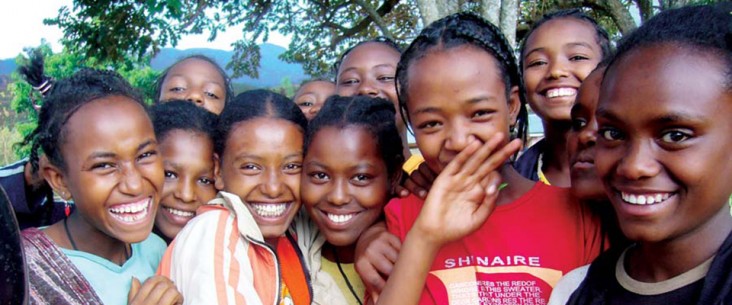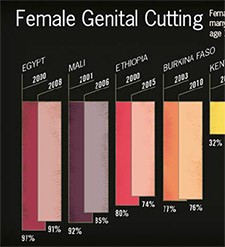- What We Do
- Agriculture and Food Security
- Democracy, Human Rights and Governance
- Economic Growth and Trade
- Education
- Ending Extreme Poverty
- Environment and Global Climate Change
- Gender Equality and Women's Empowerment
- Global Health
- Water and Sanitation
- Working in Crises and Conflict
- U.S. Global Development Lab

The U.S. Agency for International Development (USAID) joins the global community in observing February 6th as the International Day of Zero Tolerance for Female Genital Mutilation, an internationally recognized day to foster awareness of the devastating effects of female genital mutilation and cutting (FGM/C) and to renew the call for the abandonment of this harmful traditional practice. The theme of the upcoming 2017 International Day on Zero Tolerance for FGM is “Achieving the new Global Goals through the elimination of Female Genital Mutilation by 2030."
Over 200 million women and girls are thought to be living with the consequences of FGM/C. In the 29 countries where the practice is most concentrated, girls who undergo FGM/C are cut before the age of 15. In half of the countries where data is available, a majority of girls are cut before they turn five. According to UNICEF, an estimated 30 million girls are at risk of being cut within the next decade.
FGM/C is practiced across cultures and religions, though no religious texts mandate the procedure. Practiced primarily in sub-Saharan Africa, prevalence data indicates the practice also occurs in Indonesia, Malaysia, the Middle East, Latin America, and the Russian Caucuses. Due to immigrant diaspora, incidences of FGM/C also occur in the United States, Australia and in European countries.
USAID’s Support
USAID has supported FGM/C abandonment efforts since the early 1990s, considering FGM/C not only a public health issue but a violation of a woman’s right to bodily integrity. In September 2000, the Agency officially incorporated abandonment of FGM/C into its development agenda, issuing an official policy [PDF, 19KB] and strategy on FGM/C. This commitment continued in the development and implementation of U.S. Strategy to Prevent and Respond to Gender-Based Violence Globally, launched in 2012 and updated in 2016, which specifically recognizes FGM/C as a harmful practice. Combatting FGM/C, along with child, early and forced marriage, is one of the goals of the U.S. Global Strategy to Empower Adolescent Girls.Over the years, the Agency has found, through programs and research, that the process of positive social transformation can occur when programs and policies focus on enabling communities to make their own collective choice to abandon FGM/C. These efforts are enhanced by educational campaigns and policy change.
The U.S. government supports the women and men around the world who denounce this egregious practice and act to abolish it. While we have made tremendous progress over the past decade, work still lies ahead. For sustainable culture change, we must all — FGM/C survivors, elders, FGM/C cutters, medical professionals, community and religious leaders, government officials, and members of civil society and multilateral organizations — work together to overturn deeply entrenched social norms that are not only harmful to women and girls, but to achieving global developmental outcomes. .
Additional Links and Resources
- Occasional Paper: FGM/C - Health Providers Should Be Advocates for Change [PDF, 606KB]
- Female Genital Mutilation/Cutting: United States Governments Response
- U.S. Department of Justice Fact Sheet on FGM/C [PDF, 17KB]
- USAID IMPACTblog Post by Ellen Starbird, Director of the Office of Population and Reproductive Health: Why support efforts to abandon Female Genital Mutilation/Cutting?
- USAID IMPACTblog Post by Katie Taylor, Deputy Assistant Administrator for Global Health: Eliminating Female Genital Mutilation/Cutting
- Remarks by Secretary of State John Kerry on International Day of Zero Tolerance to Female Genital Mutilation
- Issue Brief: The USG Working Together to Support the Abandonment of Female Genital Mutilation/Cutting [PDF, 704KB]
- Ending FGM/C, Lessons from a Decade of Progress
- Female Genital Mutilation/Cutting Data and Trends: Update 2014
- The Donors Working Group on Female Genital Mutilation/Cutting
- DHS Report: Female Genital Cutting: The Interpretation of Recent DHS Data [PDF, 1.4MB]
- UN Resolution: Intensifying global efforts for the elimination of female genital mutilation [PDF, 53KB]








Comment
Make a general inquiry or suggest an improvement.